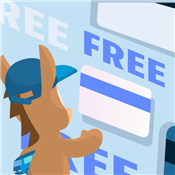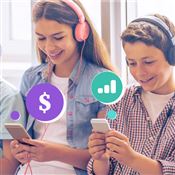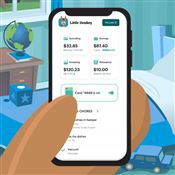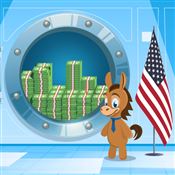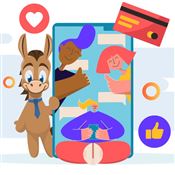Capital One Money Teen Checking Account Review
Is Capital One a good bank for your teenager? Here are the pros, cons, and fees of a Capital One Money Teen Checking account.
Overall Score | 3.6 | ||
Savings | 2.5 | ||
Checking | 3.5 | ||
Minimum Deposit to Open | 5.0 | ||
Mobile App | 3.5 | ||
Customer Service | 3.0 | ||
Ease of Use | 5.0 | ||
Education | 2.5 | ||
Pros and Cons
- No monthly fee
- Earns some interest
- 70,000+ ATM network
- No in-app educational tools
- Not all ATMs accept cash
- Limited features
Bottom Line
Basic checking account for older kids and teens
Every parent wants their kid to be financially successful.
But not everyone teaches their kids about money from a young enough age.
Without hands-on experience, many children enter adulthood with bad money management skills. With a children's bank account and debit, parents can give their kid a head start.
Capital One Money aims to introduce kids to convenient online banking. In this review, find out if Capital One Money is legit and safe for your kid.
Plus, check out how it stacks up against competitors like Chase First Banking and Greenlight.
What is Capital One Money Teen Checking?
You may know Capital One by its "What's in your wallet?" campaigns. The bank originally started out as a credit card company in 1994 and has since become one of the top national banks.
It now has more than $400 billion in total assets and offers a full range of banking services, including checking, savings, CDs, and loans.
Capital One Money Teen Checking is a no-fee checking account and debit card for kids. This joint account is geared toward teens, but parents can open an account for any kid age 8 or older.
Before reading about Capital One Money's features, take a look at the quick details to see if it's right for your kids:
| Age | 8+ years |
|---|---|
| Monthly Fee | $0 |
| Minimum Deposit | $0 |
| APY | 0.10% |
| Free ATM Access | 70,000+ ATMs nationwide |
Capital One Bank is a member of the FDIC. This means the funds in your Capital One Money account are insured up to $250,000. If the bank ever fails, the FDIC will mail you a check with your balance.
Capital One Money Key Features
 |
Capital One Money can help older kids and teens manage their money. Learn more about the account's key features below.
Debit Card
Capital One Money Teen Checking offers a free debit card for kids. Teens can use the debit card to make purchases online and in store.
Parents can lock and unlock the debit card any time in the app. As an extra safety feature, the card can't be used at places that are inappropriate for kids, including:
- Bars, nightclubs, and liquor stores
- Cigar stores
- Massage parlors
- Online prescription drug stores
- Car rentals
The debit card lets your kid withdraw cash at 70,000+ Capital One, MoneyPass, or Allpoint ATMs.
Cash deposits can only be made at a Capital One ATM or branch. There are only about 2,000 Capital One ATMs across the U.S., so your options are much more limited.
If you're still on the fence on what debit card to get your teen, here are other debit cards for teens you can check out.
Mobile App
Parents and kids each get separate logins for the mobile app. The experiences for each app are slightly different.
Teens can manage their money, set up direct deposit, and deposit checks through the app. The savings goals feature lets them separate spending money from savings. If your kid wants new shoes, for example, they can set a specific amount and deadline to reach that goal.
The app looks and feels similar to an adult banking app. It doesn't offer educational content like some other banking apps for kids. This makes it better suited for teens who want a more mature banking experience.
Parents can send and remove money from their kid's account, monitor spending, and set up allowances. The app lets you give your kid as much freedom as you want, but you're ultimately in control.
Parental Controls
Parental controls are important for any product designed for kids. Capital One Money Teen Checking offers a couple safety features to help parents keep their kids in check:
- Parental monitoring
- Spending and activity alerts
- ATM and spending limits
- Lock and unlock debit card
Your kid can still use a Capital One Money account once they turn 18. The account doesn't convert to a different account, but your kid can upgrade to a Capital One 360 Checking Account if they want. Once your kid turns 18, transaction limits get bumped up from $500 per day to $5,000 per day.
Fees to Look Out For
Capital One Money has no monthly fees or balance requirements to keep the account open or earn interest. The account can't be overdrafted, so there are no overdraft fees to worry about.[1]
There are a couple fees you might run into:[2]
- Expedited card delivery: $25
- Foreign check return fee: $10
- Cashier's check: $10
These services are all optional and pretty easy to avoid. For everyday use, the Capital One Money really is a fee-free account.
Customer Service and Reviews
If you don't live near a Capital One branch, you have a couple options to contact customer support about your bank account:
Phone
Call 1-800-655-2265 (agents are available 8:00 am - 11:00 pm EST, 7 days a week)
Twitter
Tweet @AskCapitalOne
Mail
Checking Accounts, Savings, Money Market, and CD Accounts
Capital One Bank
PO Box 98707
Las Vegas, NV 89193
Like many other big banks, Capital One has some mixed reviews in the customer service department. Some customers report long waits and turnaround times to hear back from the support team.
The mobile app generally has very positive reviews. The app has a rating of 4.7 out of 5 on the Google Play Store and 4.9 out of 5 on the Apple App Store.
Pros and Cons
Still not sure if Capital One Money is right for your kid? Review these pros and cons for the quick takeaway.
Pros
- Free banking app and debit card for kids and teens
- No overdraft fees
- Available for kids age 8+
- Access to 70,000+ Capital One, Allpoint, and MoneyPass ATMs
- Balance earns interest
- Set personalized savings goals
- Easy-to-use app
- Don't need an existing Capital One account to open
Cons
- Can only deposit cash at Capital One ATMs and branches
- Low interest rate
- No investment services
- No in-app educational tools
- Fewer features than other banking apps for kids
- No paper checks
How to Open a Capital One Money Account
A parent or guardian can open a Capital One Money Teen Checking account for kids age 8 or older.
Here's how to get started:
- Go to the Capital One Money page and click Open Account.
- Log into your existing Capital One account if you have one.
- Enter personal details for you and your child.
- Add funds.
- Confirm your account.
- Receive the debit card in the mail in 5-7 business days.
Capital One needs to check your identities when you open an account. You and your kid will need to provide details like your address, date of birth, and Social Security number.
Parents can open a joint bank account or custodial account for their minor children. Typically, children age 13 and older are eligible for these accounts. Some accounts have even lower age requirements. Every account is different, so be sure to double-check the age requirements beforehand.
How It Compares
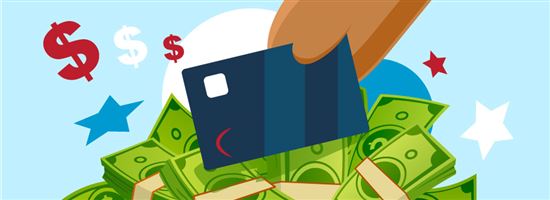 |
Find out how Capital One Money stacks up against other free and paid banking accounts for kids.
Capital One Money vs. Chase First Banking
Chase First Banking is a free kid's debit card and checking account from one of the biggest banks in the nation. You can only open this account if you're a current Chase customer, but it's a solid account if you qualify.
The account offers some features you won't find with Capital One Money, like more parental controls, limits for specific merchants and spending categories. Parents can also assign chores and set allowance amounts for completing tasks.
Kids can withdraw and deposit cash more easily since Chase has 15,000+ ATMs and 4,700 branches nationwide. Capital One may have a larger ATM network for withdrawals, but there are only about 2,000 Capital One ATMs that accept cash deposits.
These features make the account great for a wider age range. The account is open to kids ages 6 to 17. One caveat is that Chase First Banking doesn't accept direct deposit. This could be inconvenient when your teen gets their first job.
Capital One Money vs. Greenlight
Greenlight is a paid app and debit card that offers a lot more features than most free accounts. The app offers checking, high-interest savings, investing, and much more.
The app has a monthly fee, but it covers up to 5 kids per family. There are 3 different pricing plans to choose from:[3]
- Greenlight Core ($5.99/mo.): Includes kids' debit card, basic banking, educational content, parental controls, financial literacy games, credit card for parents, investing for parents with limited features, and 2% savings reward.
- Greenlight Max ($9.98/mo.): Adds an investing platform and research tools for kids and parents, priority customer support, protection plans, cash back on purchases, and 3% savings reward.
- Greenlight Infinity ($14.98/mo.): Adds family location sharing, crash detection, SOS alert, cash back, and 5% savings reward.
Capital One Money is good if your kid already has a good handle on money. But if you really want to teach your kids about money management from the ground up, Greenlight is a great alternative.
Capital One Money vs. Copper Banking
Copper Banking is a financial education platform designed to make learning about finance enjoyable for kids and teens.
Copper offers rewards for completing short quizzes and educational videos, and setting up a savings goal. The educational content is bite-sized and engaging to keep your teen interested. The app also encourages kids to set goals, budget, and save money.
Copper is open to teens and kids 6 and older. This is a great option if you're looking for a financial app that emphasizes financial literacy education.
Minors can't open a bank account by themselves. You need to be at least 18 years old to open an account. If a child is under 18, they will need a parent or guardian to set up a bank account.
Bottom Line
Capital One Money is a solid free bank account for kids. The account earns a small amount of interest and lets parents monitor their kids spending. Plus, a network of 70,000+ ATMs makes it easy to withdraw cash. On the other hand, depositing cash is a bit more difficult.
There aren't any in-app educational tools to help kids learn more about finances. But for basic, dependable checking and debit card usage, Capital One Money delivers.
Want to learn more about other banking products for kids? Check out the top accounts and popular alternatives:
References
- ^ "What are the fees for a teen checking account?": Capital One, 2022.
- ^ Capital One. Teen Checking Account Money Disclosures, Retrieved 5/6/2022
- ^ Greenlight. Plans, Retrieved 10/30/2024
Chase Total Checking® - $300 Bonus
- New Chase checking customers enjoy a $300 bonus when you open a Chase Total Checking® account with qualifying activities
- Chase Mobile® app - Manage accounts, pay bills, send money to friends with Zelle® and deposit checks from almost anywhere.
- Chase Overdraft Assist℠ - no overdraft fees if you're overdrawn by $50 or less at the end of the business day or if you're overdrawn by more than $50 and bring your account balance to overdrawn by $50 or less at the end of the next business day*
- Help keep your money protected with features like Zero Liability Protection, fraud monitoring and card lock.
- Chase Total Checking includes FDIC insurance up to the maximum amount allowed by law.
- With over 4,700 branches, Chase has the largest branch network in the U.S. plus access to more than 15,000 ATMs.
- Open your account online now
- Available online nationwide except in Alaska, Hawaii and Puerto Rico. For branch locations, visit locator.chase.com.
Discover® Online Savings - $200 Cash Bonus
To qualify for Bonus: Apply for your first Discover Online Savings Account, enter Offer Code CY325 at application, deposit into your Account a total of at least $15,000 to earn a $150 Bonus or deposit a total of at least $25,000 to earn a $200 Bonus. Qualifying deposit(s) may consist of multiple deposits and must post to Account within 45 days of account open date. Maximum bonus eligibility is $200.
What to know: Offer not valid for existing or prior Discover savings customers. Eligibility is based on primary account owner. Account must be open when bonus is credited. Bonus will be credited to the account within 60 days of qualifying for the bonus. Bonus is subject to tax reporting. Offer ends 09/11/2025, 11:59 PM ET. Offer may be modified or withdrawn without notice. Due to new customer funding limits, you may wish to initiate fund transfers at your other institution. For information on funding, see FAQs on Discover.com/Bank. See advertiser website for full details.
Bank of America Advantage Banking - $300 Bonus Offer
- The $300 bonus offer is an online only offer and must be opened through the Bank of America promotional page.
- The offer is for new checking customers only.
- Offer expires 05/31/2025.
- To qualify, open a new eligible Bank of America Advantage Banking account through the promotional page and set up and receive Qualifying Direct Deposits* totaling $2,000 or more into that new eligible account within 90 days of account opening. Bank of America Advantage SafeBalance Banking® for Family Banking accounts are not eligible for this offer.
- Once all requirements are met, Bank of America will attempt to pay bonus within 60 days.
- Additional terms and conditions apply. See offer page for more details.
- *A Qualifying Direct Deposit is a direct deposit of regular monthly income – such as your salary, pension or Social Security benefits, which are made by your employer or other payer – using account and routing numbers that you provide to them.
- Bank of America, N.A. Member FDIC.
U.S. Bank Business Essentials - $500 Bonus
Promo code Q2AFL25 MUST be used when opening a U.S. Bank Business Essentials, Silver, or Platinum Business Checking account. Limit of one bonus per business. A $100 minimum deposit is required to open one of the referenced accounts.
Earn your $500 Business Checking bonus by opening a new U.S. Bank Business Essentials or Silver Business Checking account between 4/3/2025 and 6/30/2025. You must make deposit(s) of at least $5,000 in new money within 30 days of account opening and thereafter maintain a daily balance of at least $5,000 until the 60th day after account opening. You must also complete 5 qualifying transactions within 60 days of account opening.
Qualifying transactions include debit card purchases, ACH credits, Wire Transfer credits and debits, Zelle credits and debits, U.S. Bank Mobile Check Deposit or Bill Pay. Other transactions such as (but not limited to) other Person to Person payments, transfers to credit card or transfers between U.S. Bank accounts are not eligible.
New money is considered money that is new to U.S. Bank. Funds must come from outside U.S. Bank and cannot be transferred from another U.S. Bank product or a U.S. Bank Affiliate. For accounts opened on non-business days, weekends or federal holidays, the open date is considered the next business day. Account fees (e.g., monthly maintenance, paper statement fee, etc.) could reduce the qualifying daily balance, therefore you must make deposit(s) to cover the fees to maintain the daily balance during the qualifying period to be awarded the bonus. Refer to the Business Pricing Information or Business Essentials® Pricing Information Document for a list of fees.
Bonus will be deposited into your new eligible U.S. Bank Business Checking account within 30 days following the last calendar day of the month you complete all of the offer requirements, as long as the account is open and has a positive available balance.
Offer may not be combined with any other business checking account bonus offers. Existing customers (businesses) with a business checking account or customers (businesses) who had an account in the last 12 months, do not qualify.
All regular account-opening procedures apply. For a comprehensive list of checking account pricing, terms and policies, reference your Business Pricing Information or Business Essentials® Pricing Information and YDAA disclosure. These documents can be obtained by contacting a U.S. Bank branch or calling 800.872.2657.
Bonus will be reported as interest earned on IRS Form 1099-INT and recipient is responsible for any applicable taxes. Current U.S. Bank employees are not eligible. U.S. Bank reserves the right to withdraw this offer at any time without notice. Member FDIC
CIT Bank Platinum Savings - $300 Bonus
- Transfer a one-time deposit of $50,000+ for a Bonus of $300
- 4.10% APY with a balance of $5,000 or more
- 0.25% APY with a balance of less than $5,000
- No monthly maintenance fee
- Member FDIC
Donna Tang is a content associate at CreditDonkey, a credit card comparison and reviews website. Write to Donna Tang at donna.tang@creditdonkey.com. Follow us on Twitter and Facebook for our latest posts.
Note: This website is made possible through financial relationships with some of the products and services mentioned on this site. We may receive compensation if you shop through links in our content. You do not have to use our links, but you help support CreditDonkey if you do.
|
|
| ||||||
|
|
|
Compare:







